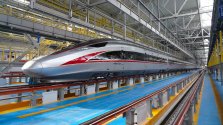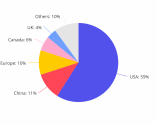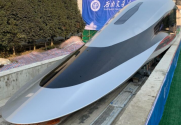You are using an out of date browser. It may not display this or other websites correctly.
You should upgrade or use an alternative browser.
You should upgrade or use an alternative browser.
News on China's scientific and technological development.
- Thread starter Quickie
- Start date
China is much of the global source of AI talent, but like many other countries, China ends up bolstering US capability by the top talent moving and working there.
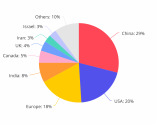
29% of top-tier AI researchers come from China (if including ethnic Chinese, then many of the American component is Chinese too, as well as much of the European/Canadian/UK/Others categories)
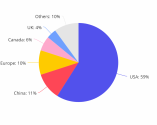
Despite being 29% of the top talent pool, only 11% are working in China. Again, much of the US and European/Canadian/UK/Others categories are ethnic Chinese, living and working as citizens in those countries.

In the first link you will find an interactive graph (screenshotted above) showing the unhinged global brain drain the US has used to become a preeminent power in AI (the same global brain drain has occurred for every industry the US has lead, since the 1950s).
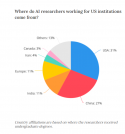
Only 31% of American top-tier AI researchers are US citizens, and of them the overwhelming majority are of Chinese and other Asian/Middle Eastern descent. The total ethnic European 'White' contribution is likely under 10%, and the total ethnic Chinese contribution to top-tier AI research that the US produces likely exceeds 40%.
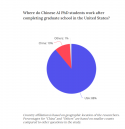
Even after completing graduate school, almost 90% of PRC citizens (not just ethnic Chinese!) stay in the US. The reversal of the brain drain has been relatively minor. It may accelerate in the next few years.
Second link from the top, Professor Steve Hsu states:
Prediction: PRC share in all 3 categories will increase in coming decades as their K12, undergraduate, and graduate schools continue to improve, and their high-tech economy grows much larger. See .
Using conference papers as the filter probably misses a lot of world class work (especially implementation at scale) that is going on in PRC at tech companies. Note in the list below the only Chinese institutions are Tsinghua and Beijing universities. But I would be surprised if those were the main accumulation of top AI talent in China, compared to large tech companies.
Attachments
This is the sort of stuff that began in research phase back in the late 1990s in China. 2000s level was basically equal to the Franco German technologies but being Chinese, the planners and leaders wanted absolute minimal risk. Such aversion to risk but a culture with gambling problems and intense embedded superstitions. But I suppose the way engineers deal with the unknown is similar to the approach China took.
China had all of its own technologies in HSR. It's not really that hard. Pulling it all off is the real feat lol.
The reason for all the tendering was partly to take a closer look at multiple types of foreign engineering approaches and see if anything can be learned even further. Evaluate the methods the Japanese took, contrast it with French and then German. Evaluate things further and make decisions on which paths to actually commit to in order to maximise efficiency, effectiveness, and economics while minimising risks and unknowns.
People think Germans and Japanese supplied some brochures and let Chinese engineers eyeball a handful of components out of the tens of thousands involved and the Chinese miraculously copied everything overnight and then built it all overnight as well as if the planning and investigations have been done for years already. Guess what? Planning and delivery was already worked on for years and the R&D has been happening all over the most prestigious Chinese universities, labs, research facilities, and Academy of Sciences for decades.
Not only has China completed service of third gen domestic HSR that has left the German demonstration level technology in the dust but also even the Japanese ones. This all sounds a bit unfair on the Germans but it really isn't because German industry and economics doesn't really focus on HSR or have any real comparable purpose for developing the set of technologies unlike China. Japan is and was just such a tech powerhouse when they committed to "new train line" 新幹線 or in Japanese the exact same thing lol shinkansen - shin che xieng. Got to give it to them.
Japan's been developing 500km/hr HSR based on maglev for years now as well. Here's to hoping the Chinese one gets into service sooner and is capable of much higher speeds for the real long range services that don't require as many stops.
China had all of its own technologies in HSR. It's not really that hard. Pulling it all off is the real feat lol.
The reason for all the tendering was partly to take a closer look at multiple types of foreign engineering approaches and see if anything can be learned even further. Evaluate the methods the Japanese took, contrast it with French and then German. Evaluate things further and make decisions on which paths to actually commit to in order to maximise efficiency, effectiveness, and economics while minimising risks and unknowns.
People think Germans and Japanese supplied some brochures and let Chinese engineers eyeball a handful of components out of the tens of thousands involved and the Chinese miraculously copied everything overnight and then built it all overnight as well as if the planning and investigations have been done for years already. Guess what? Planning and delivery was already worked on for years and the R&D has been happening all over the most prestigious Chinese universities, labs, research facilities, and Academy of Sciences for decades.
Not only has China completed service of third gen domestic HSR that has left the German demonstration level technology in the dust but also even the Japanese ones. This all sounds a bit unfair on the Germans but it really isn't because German industry and economics doesn't really focus on HSR or have any real comparable purpose for developing the set of technologies unlike China. Japan is and was just such a tech powerhouse when they committed to "new train line" 新幹線 or in Japanese the exact same thing lol shinkansen - shin che xieng. Got to give it to them.
Japan's been developing 500km/hr HSR based on maglev for years now as well. Here's to hoping the Chinese one gets into service sooner and is capable of much higher speeds for the real long range services that don't require as many stops.
I think it is a bit overcomplicated / subjectively analysed.Second link from the top, Professor Steve Hsu states:
Prediction: PRC share in all 3 categories will increase in coming decades as their K12, undergraduate, and graduate schools continue to improve, and their high-tech economy grows much larger. See .
Using conference papers as the filter probably misses a lot of world class work (especially implementation at scale) that is going on in PRC at tech companies. Note in the list below the only Chinese institutions are Tsinghua and Beijing universities. But I would be surprised if those were the main accumulation of top AI talent in China, compared to large tech companies.
The emigrant learners in the USA has to have money to finance the school from they own/parents pocket, and they consider the USA schools as good investment ,regards of later wage and immigration prospect.
After graduation , due to the high investment they want the highest paying jobs - and that happens to be in the USA again.
To change it China needs to improve the income opportunity for the Chinese university graduated persons, including but not limited the non monetary compensation , like long term stability and freedom enjoyed by the USA citizens/permanent residents.
Lot of student and family consider the USA university as an expensive, but sure path for emigration .
I think it is a bit overcomplicated / subjectively analysed.
The emigrant learners in the USA has to have money to finance the school from they own/parents pocket, and they consider the USA schools as good investment ,regards of later wage and immigration prospect.
After graduation , due to the high investment they want the highest paying jobs - and that happens to be in the USA again.
To change it China needs to improve the income opportunity for the Chinese university graduated persons, including but not limited the non monetary compensation , like long term stability and freedom enjoyed by the USA citizens/permanent residents.
Lot of student and family consider the USA university as an expensive, but sure path for emigration .
My impression is most Chinese students in the US in STEM subjects are PhD students fund by assistantships.

